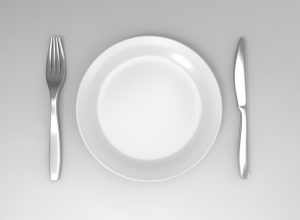Will Intermittent Fasting Make You Leaner & Healthier?
Author: Dr. Stephen Chaney
 Intermittent fasting is all the rage. If you believe the hype, intermittent fasting will make you leaner and healthier. Some of its proponents claim you don’t even need to give up your favorite foods. You don’t need to give up your Big Macs for fruits and vegetables. You don’t need to restrict what you eat. You just need to restrict when you eat.
Intermittent fasting is all the rage. If you believe the hype, intermittent fasting will make you leaner and healthier. Some of its proponents claim you don’t even need to give up your favorite foods. You don’t need to give up your Big Macs for fruits and vegetables. You don’t need to restrict what you eat. You just need to restrict when you eat.
If you read the blogs about intermittent fasting, you will come across all sorts of metabolic mumbo-jumbo about ketone bodies, adiponectin, leptin, IGF-1, and blood glucose levels. It sounds so convincing. Don’t get sucked in by these pseudo-scientific explanations. At this point they are mostly speculation.
What are intermittent fasting benefits?
Instead, ask “What is the evidence that intermittent fasting works?” More importantly, ask “What is the evidence it works in human?” Most of the studies have been done in animal model systems. Claims based on animal models may not apply to humans.
This week I will discuss a review on caloric restriction and various forms of fasting that recently appeared in Science, one of the most highly respected scientific journals (Di Francesco et al, Science, 362: 770-775, 2018 ).
This article was a comprehensive review of three closely-related dietary approaches:
- Caloric restriction in which daily caloric intake is restricted by 15-40%.
- Time-restricted fasting which limits daily intake of food to a 4-12 hour period.
- Intermittent fasting in which there is a day or more of fasting or decreased food intake between periods of unrestricted eating.
Note:
- What the review calls time-restricted fasting is referred to in the mass media as intermittent fasting. What the review calls intermittent fasting is referred to in the mass media as alternate day fasting. To avoid confusion, I will use the mass media definitions.
- I will focus on what the mass media refers to as intermittent fasting and just briefly summarize the other two approaches.
Will Caloric Restriction Allow You To Live Longer?
 The concept of caloric restriction has been around for a long time and is the best studied of the dietary approaches covered in this review. In brief:
The concept of caloric restriction has been around for a long time and is the best studied of the dietary approaches covered in this review. In brief:
- Caloric restriction has been studied in animal model systems ranging from mice to primates. In every animal model studied, caloric restriction reduced the incidence of age-related degenerative diseases and increased either life span or health span or both.
- In both animal model systems and humans, caloric restriction lowers cholesterol, lowers blood pressure, improves blood sugar control, reduces inflammation, and reduces oxidative damage.
- Populations that eat a healthy diet and practice voluntary caloric restriction appear to enjoy remarkable longevity.
- The effects of caloric restriction appear to operate via the sirtuin anti-aging pathway. Most of the other effects are downstream of this pathway.
- The effects of caloric restriction (including activation of the sirtuin pathway) are mimicked by resveratrol and related polyphenols.
In short:
- Caloric restriction and some naturally occurring compounds such as resveratrol are clearly effective in animal model systems and are likely to be effective in humans.
- However, we live too long to allow definitive studies of the effect of caloric restriction on human life span and health span.
- This dietary approach has never gained popularity because very few people want to starve themselves just so they can live a longer, healthier life.
Intermittent Fasting Benefits: Leaner & Healthier?
 There are many variations to intermittent fasting. As the review stated, intermittent fasting can mean that food consumption is restricted to anywhere from 4 to 12 hours. However, the most popular version of intermittent fasting at present restricts food consumption to 8 hours followed by a 16-hour period of fasting. Here is what you need to know about intermittent fasting:
There are many variations to intermittent fasting. As the review stated, intermittent fasting can mean that food consumption is restricted to anywhere from 4 to 12 hours. However, the most popular version of intermittent fasting at present restricts food consumption to 8 hours followed by a 16-hour period of fasting. Here is what you need to know about intermittent fasting:
- Once again, most of the studies have been done in rodents. Those studies appear to show that intermittent fasting results in weight loss, improved blood sugar control, lower cholesterol and triglyceride levels and reduced inflammation even when caloric intake remains unchanged. These findings have generated the claims you see in the media. However, you need to remember that what works in rodents does not necessarily work in humans.
- Unlike caloric restriction, the benefits of intermittent fasting are dependent on circadian rhythm. [Note: If you are unfamiliar with the concept of circadian rhythm, it is a master control that is genetically hardwired into almost every organism on the planet, including humans. In general, circadian rhythm is synchronized with the light-dark cycle.] The effect of circadian rhythm that is relevant to this discussion is that metabolic rate and many of the enzymes involved in food metabolism in humans are more active during the day than at night. Not surprising, animal studies suggest that intermittent fasting is most effective when the feed-fast cycle is synchronized with their circadian rhythm.
- The timing of the feeding portion of the intermittent fasting cycle also appears to be important for humans. According to the review by Di Francesco et al, the few clinical studies that have been performed on humans show:
- Limiting food intake to the middle of the day decreased glucose levels, cholesterol & triglyceride levels, and inflammation.
- Eating a larger breakfast and smaller dinner improved metabolic markers better than when participants ate a smaller breakfast and larger dinner.
- Type 2 diabetics attained better blood sugar control when most of their calories were consumed in the first half of the day. In contrast, restricting their calories to late afternoon or evening resulted in either no blood sugar improvement or a worsening of blood sugar controls.
- Finally, subjects lost more weight on a reduced calorie diet when most of the food was consumed in the morning rather than in the evening.
- If you read the very popular “Obesity Code” book by Dr. Fung you will discover he is recommending a diet that consists of fruits & vegetables, fiber-rich foods, healthy protein & healthy fats, and avoids sugar, refined grains, and processed foods. He also recommends avoiding snacking. That is exactly the kind of diet I recommend in my book, “Slaying The Food Myths.” If the average American adopted that diet and did nothing else, they would be leaner and healthier. So much for the claim that you can eat all your favorite junk foods and become leaner and healthier by intermittent fasting.
- Finally, most of the human clinical studies have carefully controlled caloric intake. From these studies it is apparent that many of the metabolic benefits of intermittent fasting come from synchronizing your food intake with your circadian rhythm. However, in those studies that focused on time of eating and did not control calories, food intake was reduced by intermittent fasting. This is the unacknowledged benefit of intermittent fasting. When you restrict the time period for eating and restrict snacking you generally end up eating less. Thus, the weight loss associated with intermittent fasting may be caused by reduced caloric intake rather than fasting.
What Does This Mean For You? Here are the take-home lessons from this review:
 Most of the studies on intermittent fasting have been done with animals, not with humans.
Most of the studies on intermittent fasting have been done with animals, not with humans.- Both animal and human studies suggest that the benefits of intermittent fasting result from synchronizing your food intake with your circadian rhythm. The old adage of “Eat breakfast like a king, lunch like a prince, and dinner like a pauper” may be true for most of us. [Note: Circadian rhythms vary slightly from person to person. Some people will do better by their fast at mid-day rather than at breakfast. However, they will probably still benefit by eating a bigger meal mid-day and a smaller meal in the evening.]
- Although there is no conscious effort to control calories, intermittent fasting appears to result in an inadvertent reduction in food intake by restricting the time allowed for eating and by eliminating late night snacking. This reduction in caloric intake is likely responsible for much of the weight loss associated with intermittent fasting.
- In summary, intermittent fasting appears to work, but it is not clear whether you need to follow a rigid schedule of eating and fasting. The available clinical studies suggest that if you eat a healthy, primarily plant-based diet, eat most of your calories early in the day, don’t snack between meals, and don’t eat anything after dinner, you will obtain most, if not all, of the benefits attributed to intermittent fasting.
If you define intermittent fasting that way, the professor has been doing intermittent fasting for years. He just didn’t know that was what he was doing.
Does Alternate Day Fasting Make You Healthier?
 Fasting regimens promoted for weight loss typically involve one or several days in which no or few calories are consumed followed by a period of unrestricted eating.
Fasting regimens promoted for weight loss typically involve one or several days in which no or few calories are consumed followed by a period of unrestricted eating.
At present, the two most popular regimens are the alternate day fast and the alternate day modified fast. The alternate day fast involves a 24-hour water fast followed by a normal feeding period of 24-hours. The alternate day modified fast reduces caloric intake to 25% of normal on fasting days. Here is a brief summary of what we know about alternate day fasting:
- Once again, most of the studies have been done in animals.
- Since neither animals nor humans generally consume double their normal caloric intake during the 24-hour feeding period, alternate day fasting results in an overall reduction in caloric intake. Not surprisingly, the benefits of alternate day fasting in animal studies are similar to the benefits observed with caloric restriction.
- Short-term human clinical trials suggest that alternate day fasting results in weight loss. The weight loss causes an improvement in blood sugar control, lower blood pressure, and lower cholesterol & triglyceride levels. Based on these studies, alternative day fasting is likely to be an effective strategy for short-term weight loss and has some short-term health benefits.
- However, there are no long-term studies on the effectiveness of this approach. It is highly unlikely that most people would be able to follow this regimented a diet plan long term. Thus, it is also unlikely that the weight loss and health benefits can be maintained long term.
- Finally, fasting is not for everyone. It is generally not recommended for people who are hypoglycemic, the elderly, pregnant women, and people with eating disorders.
The Bottom Line
In this article I discussed a recent review of intermittent fasting and other approaches that involved fasting or long-term caloric restriction. Here are the take-home lessons on intermittent fasting:
- Most of the studies on intermittent fasting have been done with animals, not with humans. Many of the claims you hear about on the benefits of intermittent fasting are based on the animal studies. They may not apply to humans.
- Both animal and human studies suggest that the benefits of intermittent fasting result from synchronizing your food intake with your circadian rhythm. The old adage of “Eat breakfast like a king, lunch like a prince, and dinner like a pauper” may be true for most of us. [Note: Circadian rhythms vary slightly from person to person. Some people will do better by breaking their fast at mid-day rather than at breakfast. However, they will probably still benefit by eating a bigger meal mid-day and a smaller meal in the evening.]
- Although there is no conscious effort to reduce calories, intermittent fasting appears to result in an inadvertent reduction in food intake by restricting the time allowed for eating and by eliminating late night snacking. This reduction in caloric intake is likely responsible for much of the weight loss associated with intermittent fasting.
- In summary, intermittent fasting appears to be beneficial, but it is not clear whether you need to follow a rigid schedule of eating and fasting. The available clinical studies suggest that if you eat a healthy, primarily plant-based diet, eat most of your calories early in the day, don’t snack between meals, and don’t eat anything after dinner, you will obtain most, if not all, of the benefits attributed to intermittent fasting. If you define intermittent fasting that way, the professor has been doing intermittent fasting for years. He just didn’t know that was what he was doing.
For more details on intermittent fasting and for a discussion of long-term caloric restriction and alternate day fasting read the article above.
These statements have not been evaluated by the Food and Drug Administration. This information is not intended to diagnose, treat, cure or prevent any disease.
